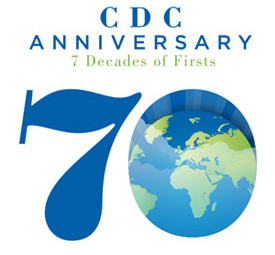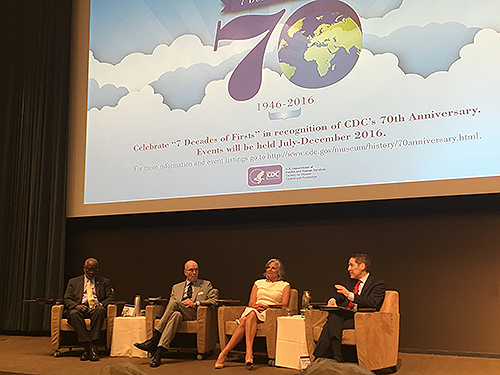You are here
CDC at 70: Seven Decades of Protecting America and The World
 Anniversaries offer a time to reflect on the past and look toward the future. This week, the Centers for Disease Control and Prevention (CDC) celebrated its 70th anniversary. As part of this commemoration (7 Decades of Firsts), former CDC directors gathered with staff and retirees to reflect on the agency’ past successes and challenges while considering CDC’s next phase in protecting Americans health, safety and security.
Anniversaries offer a time to reflect on the past and look toward the future. This week, the Centers for Disease Control and Prevention (CDC) celebrated its 70th anniversary. As part of this commemoration (7 Decades of Firsts), former CDC directors gathered with staff and retirees to reflect on the agency’ past successes and challenges while considering CDC’s next phase in protecting Americans health, safety and security.
CDC has grown far beyond its deep roots in Atlanta with an influence today that is far reaching, as the agency has become a linchpin in protecting the health of our nation and increasingly that of the world.
Organizations like CDC don’t become influential and successful and remain that way without outstanding leaders. And CDC’s 70th anniversary event brought together seven former leaders, either in person or by video, to share their experiences leading the agency. Those participating in the event included Drs. Bill Foege (1977–1983), James Mason (1983–1989), Bill Roper (1990–1993), David Satcher (1993–1998), Jeff Koplan (1998–2002), Julie Gerberding (2002–2008) and current CDC Director Dr. Tom Frieden (2009–present). It was fascinating to hear the health challenges and achievements each director described. I would agree with Dr. Foege who said that CDC is the world’s “gold standard” for protecting the public’s health.

CDC published a timeline, featuring highlights of its work. These highlights include recent events, like beating back Ebola in West Africa and the fight aimed at eradicating polio from the globe. The timeline also features other key events in the agency’s history, such as work on HIV/AIDS, the global eradication of smallpox and groundbreaking work linking high levels of lead in blood from exposure to gasoline.
During the course of my career, I have developed a deep appreciation for CDC’s health protection work. As a clinician, clinician educator and director in a hospital, I relied on CDC’s guidance to treat patients, teach students and run health programs. Then, as state health officer in Indiana, I had the opportunity to work hand-in-hand with CDC carrying out population-focused health efforts. Following this experience, I worked at CDC for six years setting up the agency’s Office of State, Tribal, Local and Territorial Support before joining the CDC Foundation as its president and CEO this year.
My involvement with CDC has been a privilege, and I’m not the only one who holds CDC in such high regard. CDC consistently ranks in surveys in the United States as one of the most-respected government agencies. Across the globe, CDC is admired and sought out. I believe that’s because CDC is focused on improving health and saving lives versus seeking organizational credit. That’s a characteristic to be deeply admired in this day and age.
On behalf of the CDC Foundation’s board of directors and staff, we congratulate CDC on 70 incredible years. It is an honor for us to be able to support the agency’s life-saving work, and we salute our extraordinary CDC colleagues for their ongoing commitment to protect us all.
